|
|
|
|
 |
|
 |
|
HOME > Resources >
Licensing and Contract |
| |
| |
|
Assigning and Licensing |
|
Assigning your IP rights
means to transfer your
IP ownerships to another
person. Once you assign
your IP rights, you can
no longer control the
IP; the assignee will
have this control. In
contrast, a licensing
transfers the IP rights
from the licensor to the
licensee in a specified
manner for a specified
time in a specified
region. The licensor
continues to owns the IP
rights and maintain
control.
|
| |
|
Licensing IP rights |
When you license your IP
rights, a licensee is
allowed to make, use and
sell products and
services based on them.
In return, the licensee
should pay royalties to
you based on the
agreement. There are a
number of different
types of licenses that
you can grant:
● Non-exclusive license
can be granted to many
licensees in order to
spread the risks and
rewards. The licensor
can maintain a better
control over IP rights.
● Exclusive license
gives the licensee the
exclusive right to
exploit your IP rights,
which even excludes the
rights of the licensor
in the territory.
●Sole license is a kind
of an exclusive license,
You as well as the
licensee retain the
right to use your IP,
but no one else can. |
| |
|
Licensing Agreement |
Your licensing agreement
should cover the
followings:
● Territories the
agreement covers
● Royalties you can earn
and when are paid
● Licensor and Licensee
Obligations to maximize
the potential of IP and
to solve
disputes to arise during
the agreement
● Expiration and
Termination to come to
an end the licensing
agreement |
|
|
|
|
|
|
|
|
|
|
|
|